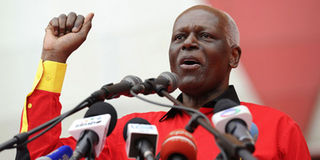Prime
Dos Santos keeps Angola guessing but signs are clear

Former Angolan president José Eduardo dos Santos
What you need to know:
President dos Santos said his party was ready to win the next year’s elections. The polls will be the third since the end of the war in 2002
LUANDA.
The Angolan currency, kwanza, has been on a downswing, especially after the global oil prices came down as the southern African country is heavily dependent on its oil.
The kwanza crisis, plus political grievances that have been building seem to threaten the country’s economic growth.
But even then, the country’s top dogs still seem to focus on one issue: political succession or self sustenance.
When the country’s ruling party met recently, the aging man of Angolan politics, President José Eduardo dos Santos, was handed a fresh political mandate to head the country’s Popular Movement for the Liberation of Angola (MPLA). Not that there was any apparent threat anyway. But there had been growing suspense over the issue.
Latest from his hat of tricks was the appointment of João Lourenço Angolan defence minister, as his deputy. That effectively cleared Manuel Vicente out of the succession line.
“The priority now is to aid the party’s president and to refine the machinery for the next commitments” Mr João Lourenço, the former party’s general secretary, told journalists after his promotion.
The highly placed soldier is expected to help the president secure his hold onto power.
“The President seem to believe that he has caused wounds to several people. Now he sees the dynasty solution exhausted.
“He needs someone who guarantees him and his family some security” a Portuguese newspaper Expresso in Angola quoted an unnamed source from the ruling party.
In 2014, Reuters news agency speculated that Mr João Lourenço’s appointment as the country’s defence minister elevated him to the frontline of Angolan politics and also placed him in charge of a large part of the country’s budget.
Before he was appointed defence minister, he was serving as a second deputy speaker in the country’s parliament.
“He is a prestigious figure both inside the ruling party and the country’s society, well educated, high reputed and with a high oratory capacity” Club K, an Angolan publication described him last year.
Even as the president secures his path to sunset, there are fresh threats.
Before the party’s congress opened, one of his veteran militants made an astonishing statement. Mr Ambrósio Lukoki,a staunch supporter of the ruling party asked his name be removed from the Committee Central (CC) list. This is the organ than decides on critical issues of the party.
At a press conference, Mr Lukoki accused president Dos Santos of blemishing party’s image due to his unpopularity.
In March, President José Eduardo dos Santos indicated he would quit politics in 2018.
He is the second longest serving leader after he was re-elected in In 2012, having ruled the country since 1979.
Dos Santos’ current term ends in 2017. He has not yet explained why he would leave a year later, causing a lot of speculation. It is also not clear whether he will go for yet another term.
“The party’s and country’s leader are recording an unprecedented unpopularity” Mr Lukoki said.
According to the party member, decisions are imposed and Dos Santos has rules by the iron fist.
Mr Lukoki, a former party’s founder Agostinho Neto close ally, said it does not make sense for him to remain in the party’s decision making organ as all decisions are imposed.
When it came to the election of the party leader, 99.6 per cent of the votes were cast in favour of José Eduardo dos Santos. He clinched 2,543 votes in his favour, five against and five abstentions. The party leader is meant to be the flagbearer in the country’s general election scheduled for August 2017.
Eying victory
President dos Santos said his party was ready to win the next year’s elections. The polls will be the third since the end of the war in 2002.
In June, dos Santos appointed his eldest daughter, Ms Isabel dos Santos, a non-executive administrator of the state-owned oil firm Sonangol.
“When the idea is to avoid discontent inside an organisation, the solution is not to reduce ( size of the party organ in this case ) but to enlarge” Mr Vicente Pinto de Andrade, a former ruling party militant, said adding that the move was meant to manage transition.
Another political analyst takes no notice of certain youth entrance to the party’s deliberative organ.
For Mr Agostinho Sicato, a political analyst, opposes the idea of dynasties in a political party, which excludes deserving members.
On his part, President Dos Santos is grateful for the opportunity to continue serving the party.
“I promise to play my role as a president of the party with professionalism, patriotism and accomplishing the deliberations of the congress,” he said.
Africa Review (Africa Review is a Nation Media Group initiative to tell untold African stories).



